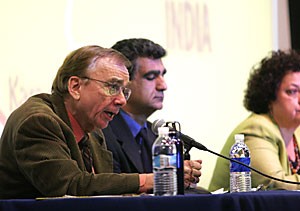More than 100 UA undergraduates, graduate students and Tucson citizens gathered last night to hear UA professors discuss the United States’ involvement in the Middle East.
The forum, Iraq, Iran and the U.S.: Problems and Perspectives, was sponsored by the Center for Middle Eastern Studies. It featured five UA professors who each spoke for 10 to 20 minutes on a different topic concerning the U.S. and the Middle East.
The panel featured Charles Smith and Kamran Talattoff, Near Eastern Studies professors; Richard Eaton, a history professor; Maggy Zanger, a journalism professor; and David Dunford, former U.S. ambassador and current political science adjunct professor.
The professors spoke on subjects ranging from the U.S.’s “”failure”” in Iraq to Americans’ misperception of the Iranian people.
Smith spoke first and warned of the possibility of the U.S. repeating mistakes in Iraq in a possible war with Iran.
“”The recent troop surge (in Iraq) appears to be working, but appearances can be deceiving,”” Smith said. “”We do not have a promising situation in Iraq.””
Eaton, a former Peace Corps volunteer in Iran, followed Smith. He spoke about Israeli influences in the U.S.’ relationship with Iran and blamed the “”hysterical rhetoric”” of the media for scaring Americans into war.
Zanger, a training director for the Institute for War and Peace Reporting in Iraq, spoke next and discussed Kurds in northern Iraq, with regard to Turkey and Iran.
Zanger called the Iraqi Kurds’ presence “”destabilizing”” and touched on Turkey’s possible invasion of northern Iraq.
Talattoff, speaking next about Americans’ collective perception of Iran, accused the media of painting a “”contradictory picture”” in the minds of U.S. citizens.
“”Iranians would love to achieve enduring peace and freedom,”” Talattoff said. “”And historically, they have been very pro-American.””
Lastly, Dunford opened his speech with the many negative outcomes that have resulted from the U.S. invasion of Iraq.
“”The Iraq invasion is one of the greatest strategic blunders in U.S. history,”” Dunford said to loud applause from the audience.
Afterward, the panel answered audience questions.
“”I agreed with the idea that the American public is shown only the things that help to further the U.S. government’s political aspirations,”” said Raymond Kosick, a geography senior. “”But I wish (the panel) would have focused more on the history of the area and how things came to be.””









